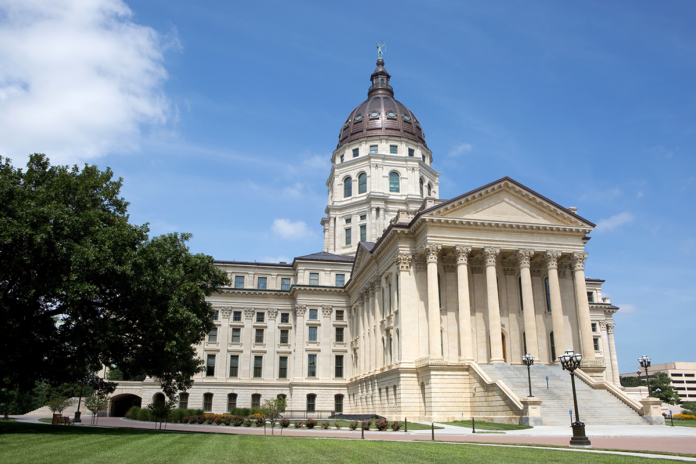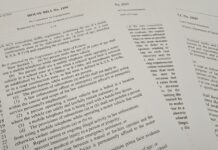Here are six quick takeaways from Gov. Laura Kelly’s second State of the State address to a joint session of the Kansas Legislature on Wednesday night. Here is a link to the full speech in case you didn’t see it on television.
Medicaid, Medicaid, Medicaid
The governor once again reinforced the importance of expanding Medicaid. She campaigned on the issue, and it might very well be the legacy of her administration.
She’s got a deal on the table with Republican Senate Majority Leader Jim Denning.
The two haven’t always got along, but they set aside their differences to come to a broad plan that not only includes expanding Medicaid coverage but goes much further by trying to reduce insurance rates on individual insurance exchanges created by the Affordable Care Act, providing more Medicaid coverage for mental health and stabilizing rural health care.
Kelly pointed to the political popularity of Medicaid expansion, perhaps a nod toward this year’s legislative elections.
She underscored Kentucky, where a governor who supported work requirements for Medicaid expansion was voted out of office, and Virginia, where Democrats took control of the Legislature defending Medicaid expansion.
“The number of expansion states continues to increase. No state has reversed its decision to expand,” she said.
“And voters across the ideological spectrum continue to reaffirm their support for
expansion in election after election.”
Transportation
Gov. Laura Kelly promised a new comprehensive transportation plan, the fourth in the state’s history. She plans to fund the plan by ending transfers out of the transportation department to the general operating budget. She planned to end those transfers by 2023. However, she warned it was not an absolute promise: “I’ve always been clear that this pledge comes with one critical caveat: stable state revenues.”
Taxes
The governor seemed to follow some of the recommendations of the task force she set up to study tax policy into this year, promising property and food tax relief.
She alluded to her tax council’s recommendation to implement a refundable sales tax credit to alleviate the state’s high sales tax on food.
The council proposed a food tax credit with limits based on federal adjusted gross income that would be restricted to taxpayers who were residents for an entire year. The rebate could potentially affect 400,000 Kansans.
The council also recommended putting money back into a fund that sends money to local government to help keep property taxes low.
The state last put money into the fund in 2003. The Legislature has suspended about $898 million in transfers to the fund from the second half of fiscal year 2003 through fiscal year 2019.
“Together, the food and property tax relief I will offer will take meaningful strides in re-
building our overall tax structure so that it is more fair and more fiscally responsible,” she said. “But it is only the first step of what must be a multiphased, multiyear process.”
Taxes Part II
The governor did not mention — except maybe in an oblique way — anything about returning the so-called windfall in state revenue because of changes in the federal tax code.
This is a battle that unfolded in the governor’s favor last year when the Legislature couldn’t muster enough votes to override her veto of two tax bills that she characterized as fiscally reckless.
She vetoed two bills that would have allowed Kansans to itemize on their state return if they didn’t itemize on their federal return.
The itemizations were rolled together with provisions that also would have decoupled from the federal tax code so that multinational corporations would not be taxed on money made overseas that’s returned to the United States.
One bill she vetoed would have given up about $240 million over three years and another would have given up about $500 million over three years.
While she didn’t mention the windfall specifically, she warned that she could use her veto pen again.
“I want to be clear: To protect our recovery, and to ensure Kansas does not repeat the
mistakes of the last decade, I will veto any tax bill that comes to my desk that throws our state back into fiscal crisis, or debt, or sends us back to court for underfunding our schools,” she said. “I hope you all won’t stand for it either.
Kansas economy
While the state’s economy is improving, Kelly warned about the future of the aircraft industry and agriculture.
Kelly noted the layoffs at Spirit AeroSystems, which has suffered from Boeing’s suspension of production of the 737 Max.
“Even as we speak, thousands of Wichita families are suddenly fearful that soon they may be unable to provide for their families,” she said.
She added that Kansas agriculture also finds itself at a “precarious moment.”
She said net farm income has plummeted 50% from 2013. She said the issue is complicated by historic flooding last spring and heightened trade tensions over the last two years caused by tariffs levied by President Trump’s administration.
She called on Congress to ratify the United States-Mexico-Canada Trade agreement.
“I have been a vocal proponent of the USMCA agreement from the beginning. I commend the U.S. House of Representatives for passing this agreement, and urge the U.S. Senate to do the same. It’s critical for Kansas.”
Hot issues untouched
The governor did not address two of the hottest issues that will confront the Legislature, potentially since her voice on both matters will be limited.
A supporter of abortion rights, Kelly did not discuss the constitutional amendment that’s being drafted to reverse a state Supreme Court decision finding the right to an abortion is protected by the state constitution.
She also did not tackle another proposed constitutional amendment that would give the Senate the right to confirm the governor’s nominations to the state Supreme Court.
Kelly could not veto either one of those proposals since they are constitutional amendments that would need to be ratified by the voters.
















